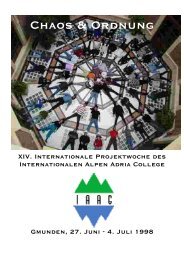ZEITREISEN - IAAC
ZEITREISEN - IAAC
ZEITREISEN - IAAC
Sie wollen auch ein ePaper? Erhöhen Sie die Reichweite Ihrer Titel.
YUMPU macht aus Druck-PDFs automatisch weboptimierte ePaper, die Google liebt.
the rise of a system into similar branches is typical. We can observe stable forks that are suddenly<br />
split into two, then into four, eight etc. branches. Though each new branch is developing separately,<br />
from macroscoping point of view – from outside, we can recognise zones where the new generation of<br />
population appears!<br />
CHAOS and ORDER<br />
Though the creation of new whirls or branches depends on local conditions that are fully stochastic –<br />
unpredictable, the process of the whole original system is the result of natural laws. Laws of<br />
COMPLEXITY that belongs to the THEORY OF CHAOS.<br />
Chaos is a newly recognised class of everywhere presented phenomena, part of the ORDER of our<br />
NATURE, based on its complexity. Also in chaos there is playing a significant role the feedback<br />
between the past and future. But CHAOS is a kind of order that doesn’t possess periodicity.<br />
On the other side, while the behaviour of a chaotic system seems randomly it has DETERMINISTIC<br />
CHARACTER that causes, that its behaviour is in principle - but never exactly - repeatable.<br />
Deterministic means that there are real properties of the real system that prescribe its behaviour in<br />
future. Because every real system is open, a random influence can turn its behaviour in a relatively<br />
unexpected way. However, by the theory of chaos there is a challenge to predict also the time<br />
development of such systems.<br />
Thus, the Space is a coincidence of SCATTERING and RANDOMNESS. Also randomness has some<br />
direction and, together with scattering, can create a surprising structured complexity. In this spirit, the<br />
famous idea of Einstein:<br />
“The God does not play with us cubes”<br />
– the development of the UNIVERSE is already determined - lost its essential meaning and was<br />
reformulated by Joseph Ford as follows:<br />
“The God plays with us cubes, but there are pieces of lead in each of them” and our task is to<br />
discover how they are built in.<br />
Reference<br />
[1] James Gleick, Chaos: Making a new science,<br />
[2] http//: www.scholaludus.sk<br />
What is Time? (comments to a lecture of K. Teplanova)<br />
So, we had a lecture about the topic ‘what exactly the time is’. Lecture started in the big theater room<br />
(Festsaal) at 15 o’clock and almost everybody got there. Our lecturer was Katarina Teplanova from<br />
Slovakia’s Comenius University. The lecturer’s English wasn’t very good but I think that everybody<br />
could understand the basics of the lesson. It wasn’t just about the time but the whole stuff connected<br />
to the time. Pretty exciting also because we could participate in her lecture - the teacher was<br />
correcting us in the answers to the questions she gave us and we could try to answer to ourselves to<br />
the basic questions about time and I have to say, that it wasn’t as easy as anybody could think. What<br />
would you say when somebody asks you: ‘What The Heck Does Speed Mean?’ Try to answer and<br />
after your answer read the next sentence...I will wait...if you’re not a teacher of physics I think you<br />
didn’t answer right. The answer is very simply, but complicated (exact): ‘Change In A Unit Of Time’.<br />
The presentation took about two hours and something.<br />
So the last thing I would say about this is that I loved it – maybe It’s also because I like physics and<br />
technical stuff.<br />
<strong>ZEITREISEN</strong> - 16. INTERNATIONALE PROJEKTWOCHE DES <strong>IAAC</strong> IN TANZENBERG SEITE 47





